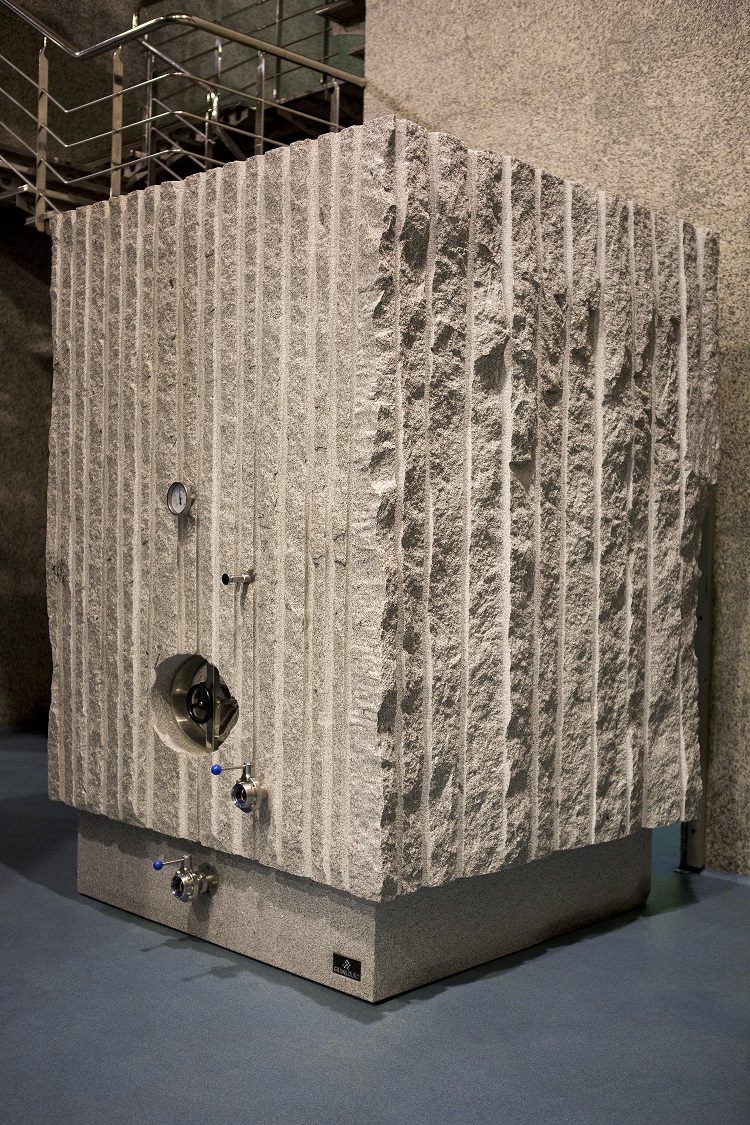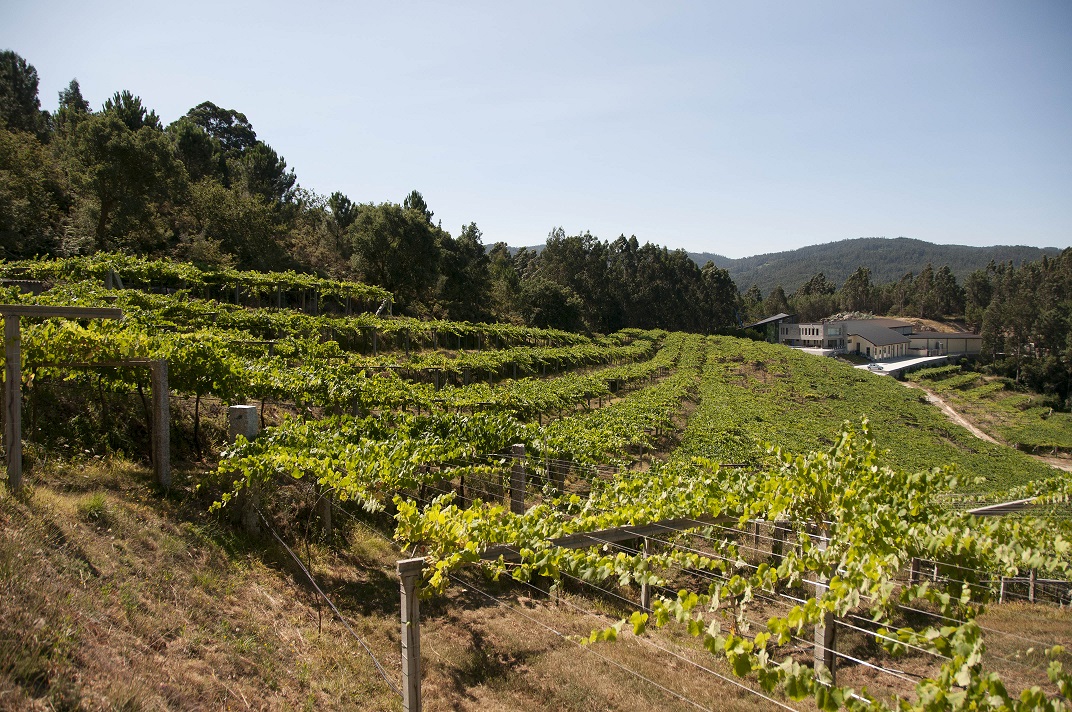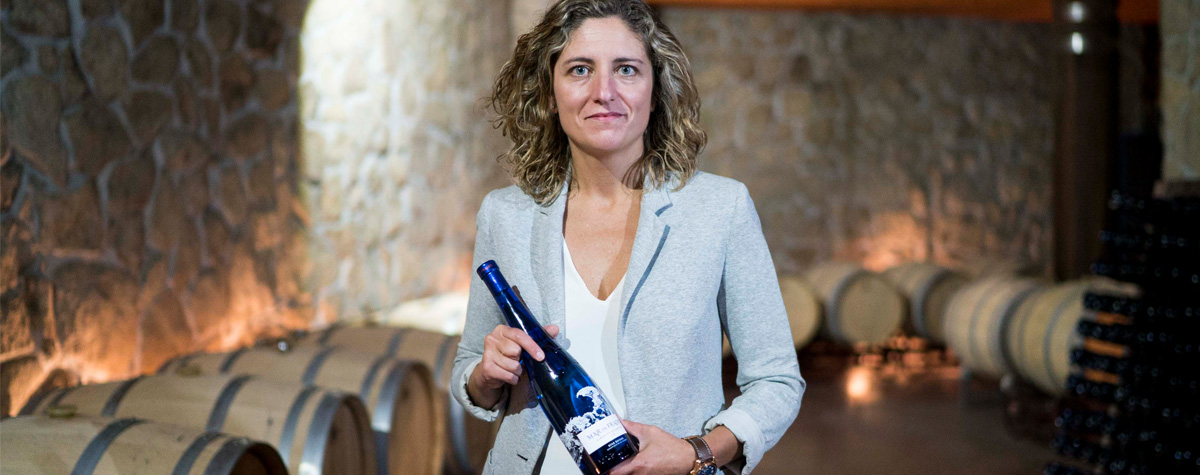But the Galician native’s most unusual technique involves macerating white grapes in stainless steel vats adapted for ‘the Ganimede method’, which is usually reserved for red grape fermentations. Another of her ideas is to use a tank made from granite to enhance grapes from granite-rich soils.

Canopy met Paula at a tasting in London. The event started with her sparkling Albarino, Mar de Frades Brut Nature, and finished with another major departure for this winery – wines made from Godello grapes.
Two of the most intriguing wines at the tasting were the two single-vineyard Finca Valiñas 2016s. The Albarino grapes were hand-harvested in the same 2m-high pergola-trained plot behind the winery and underwent the same maceration process before being split for fermentation in either barriques or stainless steel.
The idea behind using the Ganimede method for the maceration stage, according to Paula, is “to avoid oxidation”.
It also means she doesn’t have to add sulphur dioxide at this stage and can get away with much less SO2 overall. The process also helps to maintain the minerality and the fruit and floral aromas of the Albarino grape, she says.
The process
Destemmed – but not crushed – grapes are poured into the 20,000L tank. The tank is then flooded with CO2. The pressure of the CO2 gently breaks down the grapes while also protecting them from oxidation. “The enemy of this kind of wine is oxygen,” Paula states. “That’s why I use CO2 for this kind of method to work the must and the wine.”The must is kept at about 12°C during the maceration period (usually 24-60 hours).
“You have to taste every two or three hours because the must is changing,” Paula advises.
Yeast
After gentle pressing, the wine ferments in normal tanks with native yeasts doing all the work. “Usually,” according to Paula, “with no problem.”Sugar levels
Paula is looking for lower alcohol in her wines nowadays. The norm used to be 13-13.5% abv, but she now thinks 12.8% is ideal. “12.8% is the perfect alcohol and 10g/l is the perfect tartaric acidity for Albarino, for well-balanced wines after fermentation,” she says.Vineyards
Paula trained as an agronomist before gaining a master's degree in oenology. This means she is just as happy talking about the vineyards as the wine. Mar de Frades, part of the same group as Ramón Bilbao and Cruz de Alba, has 35ha of its own vineyards in production and planted another 30ha this year – 20ha in one plot. “In five years we will be self-sufficient,” she says.Until then, Paula will continue to buy grapes from about 150 small growers in the Salnès Valley – paying them according to the sugar and acidity levels (not just the sugar levels like other producers). “I look for the balance of sugar content and acidity,” she confirms, as we taste through the impressive line-up of wines.

Picking time
The ripening period for Albarino in the Salnés Valley is ten days, according to Paula. The picking date is crucial for her as it determines the flavours in the finished wine. “At the beginning of the ripening period the flavours are apple, pear, fruity, fresh, floral, and at the end of the ripening (period) the flavours are apple pie, jam, marmalade and that kind of flavour,” she states.She sees her role as keeping “all the flavours in the winery until the wine is bottled”.
Granite tanks
This harvest Paula started using a 2,000L granite tank for ageing on fine lees “to see how the Albarino grape behaves in ancestral and native materials”.The properties of granite include crystalline texture, low permeability, thermal stability, and variation in porosity.
“It’s the stone our great-grandfathers used a century ago,” Paula reflects. “It’s the typical material of the region.”
The first wine from this project is not expected to hit the market until at least 2020.
“It is a very demanding project in which we do not want to be in a hurry,” she says.
When this new “high-profile” wine is released, it will add another dimension to Mar de Frades’ Albarino portfolio.
“It’s the future of Mar de Frades,” Paula concludes. “It’s our way to think of different Albarino wines.”
The bottles
Founded in 1987, Mar de Frades became part of Spain’s family-owned Zamora Company in 2002. Since then it has become recognised as one of Rias Baixas’ most adventurous and innovative producers. Its wines not only stand out for the flavours and the innovative use of technology, but also for the bottles. The blue bottles now come with thermochromic labels displaying a tiny galleon when the bottle is chilled to the appropriate serving temperature. The origin of Ganimede
The Metodo Ganimede was developed by Italian winemaker Francesco Marin in the late 1990s. He wanted to use the natural potential of CO2 during the fermentation process to obtain a delicate and soft extraction without the need for pump-overs or punch-downs. He also wanted a process that was economical, simple and effective.One important feature for red wine producers is the ability to remove seeds relatively easily after the second day of fermentation.











.png)









